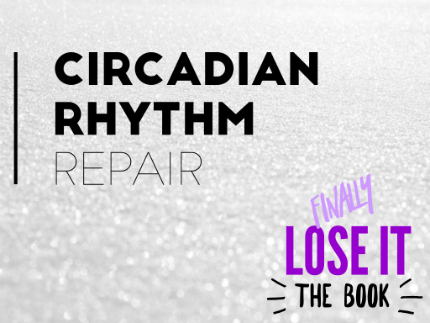The past few weeks we’ve been talking about our circadian rhythm (See HERE, and HERE) – our internal 24-hour clock that regulates many of our body’s systems, including fat burning and storage. It doesn’t get talked about much, if ever, which is why I’m here to share the facts and get your rhythm back in order. Here are two of the easiest things you can do to jumpstart your circadian rhythm and overcome your weight loss resistance.
Maximizing morning light
If you’re in Canada like me, you know this has felt like (*cue dramatic voice*) the longest winter ever. Dark days, dark nights – we can’t seem to catch a break. On top of that we live far from the equator and more likely than not we spend most of our time indoors. Even in the summer months we live inside, drive to work or commute by public transit, and then work inside all day. This all causes alterations in our circadian rhythm which affects metabolic hormones, non-exercise activity thermogenesis, and cravings (hello, comfort foods!).
If your body does not get morning light exposure, then you won’t have a strong signal saying “hey, its morning”. Your cortisol and digestive functions will be weak at best, and you can lose the sync and rhythm of your metabolic hormones. All the odds seem to be stacked against us, but I promise there is something we can do. After spending the night asleep in darkness, it’s important to get bright light in the morning to “retrain”’ or reset your circadian rhythm. Research shows those who get proper morning light not only have improved moods and energy but also they have a lower body mass index, or weight.
The Solution: Get at least 20 minutes of bright light each morning. Morning walks are a great solution!
It’s not only what you’re eating; it’s when you’re eating that impacts your weight loss.
Much like our circadian rhythm is our internal clock, we also have peripheral clocks to help send signals back to the brain to help coordinate the circadian cycle. These peripheral clocks include the organs involved with digestion, including our liver, pancreas, and kidneys. Food consumption, or lack there of, dictate when to make digestive enzymes, when to make metabolic hormones (such as leptin, insulin, glucagon, and ghrelin to name a few), and also how much to make. Eating irregularly or eating during at night (in the dark) can wreak havoc on our systems. So what is this telling us? Timing of eating is as important as what you’re eating.
Are you eating well but still struggling to lose those 10 pounds? Well it’s time to switch the focus. Two big culprits are snacking and eating after sundown. These can contribute to elevated insulin levels. If you’ve read my book Finally Lose It, you know that insulin is a fat storage hormone. That means your late-night snack goes right to your belly and stays there! Ideally, insulin should be low overnight and between meals to allow you to burn your fat as fuel.
The Solution: Cut the snacking and don’t eat after sundown. Instead, make each meal satiating and nutrient-dense.
These two hacks to repairing your circadian rhythm are what I think all interventions should be – straightforward and simple to implement. Have you already perfected these or are you interested in learning more ways to repair your circadian rhythm? You can find a whole chapter about our circadian rhythm and ways to repair it in my book, Finally Lose It.
After you read it don’t forget to leave a review! I would be eternally grateful and it helps more people find it, and change their lives as well.

